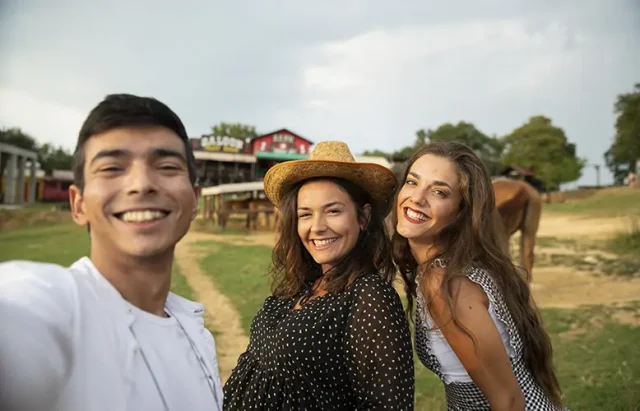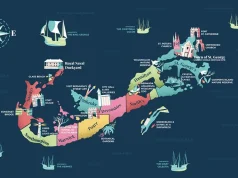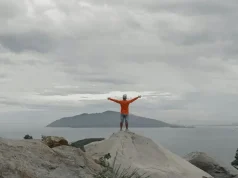
Every time we travel, we have the opportunity to learn from other cultures, immersing ourselves in the destination. Whilst many of us set off on our holiday looking for relaxation and a bit of sightseeing, how many of us truly take it slow and enjoy the moment?
This is where the idea of slow travel may appeal to those looking for more from their experiences whether travelling within the UK or further afield. Your trip shouldn’t just be about ticking boxes on your to-do list or snapping quick photos before moving on. The idea is to have a genuine connection with the different environments, cultures, and people we encounter. If the sound of lingering longer, exploring deeper, and living like a local sounds more interesting than the average holiday, maybe slow travel is for you.
This approach is not only more rewarding for you but also kinder to our planet. By taking your time, you can help sustain the communities you visit and make a positive impact on the environment. So, why rush?
The Benefits of Slow Travel
Taking it slow with travel is the ideal way to enhance your experience, after all, you’ve been looking forward to your trip away so why would you want time to fly by? Here’s how embracing a slower pace can enrich your travel experience:
Deeper Cultural Immersion
By spending more time in a location, you have the opportunity to delve beyond superficial tourist experiences. Yes, there are some sights you just have to see, but why not consider attending local events, eating at neighbourhood spots that aren’t big chains, and engaging with the locals on a more personal level too? This deeper immersion allows for a genuine understanding and appreciation of local customs, traditions, and the daily rhythms of life, which are often missed by traditional tourists.
Encouraging Sustainability
Slow travel is inherently more sustainable. According to the Rapid Transition Alliance, who work towards tackling climate change, slow travel has a growing focus on sustainability and self-care that promotes travelling in a more environmentally friendly way. Staying longer in one place reduces the need for frequent travel too, which in turn lowers your carbon footprint. By using local services and products, you support the local economy and help prevent the issues that mass tourism can bring.
Your Own Personal Growth
Travelling slowly gives you time to reflect, learn, and grow. It challenges you to adapt to new ways of living and thinking, which can expand your worldview and increase your self-awareness. You’ll have a newfound appreciation for different places and cultures and how other like-minded people live. It’s not just a holiday but a chance to enhance your own daily life long after you return home.
Planning and Preparing for Slow Travel
So, how can you embrace slow travel and plan appropriately? It’s all in the small details and preparation, and just like being away, you’ll want to take your time with planning. No rushed itineraries, but instead thoughtful planning for the ideal trip.
Here are some of the things to consider to immerse yourself in the local culture and pace of life:
Find The Ideal Destination
This can be the tough part as there are so many stunning destinations you can explore slowly. Consider places with cultural richness where there’s so much to learn about the history and local customs. Think about where you can immerse yourself in nature and the surroundings too. If you can find a balance between both, you’ll be kept busy no matter if staying for a long weekend or a few weeks.
Pick The Ideal Base To Explore
Look for accommodation that allows you to feel part of the community. This could be a small, local apartment through a site like Airbnb to really feel like a local. This can give you a more authentic living experience but also contribute more directly to the local economy compared to large, impersonal hotels.
Take A Smart Packing Approach
Packing for slow travel is about finding the balance between being prepared and travelling light. Focus on versatile clothing that can be layered and is suitable for the local weather. Consider also packing items that help reduce your environmental impact, such as reusable water bottles and shopping bags.
Set Expectations For Each Day
It’s important to prepare mentally for a slower pace. Unlike typical getaways, where the goal might be to see as much as possible, slow travel is about depth rather than breadth. Allow more time for relaxation and spontaneous activities that allow you to engage with locals and their lifestyle whether it be exploring a local market or enjoying local cuisine.
Preparation will help you settle into your new environment more smoothly and enjoy the enriching experiences that slow travel has to offer. You want to be as flexible as possible, so be ready to adapt your plans as opportunities arise to deepen your connection with the place and its people. You may discover something surprising that was better than your original plans.
Engaging with Local Communities
Engaging authentically with local communities is at the heart of slow travel. Here are some ways to ensure your interaction is meaningful and mutually enriching:
Language and Communication – Learning the local language, even just a few basic phrases, can significantly enhance your experience. It shows respect for the culture and can help create deeper connections with residents.
Participating in Local Activities – Dive into the local scene by participating in activities that hold cultural significance. Attend community events, festivals, and local markets. This not only offers an insider’s look into the daily life and traditions but also helps you pick up more about the people and their way of life than reading a guidebook ever would.
By engaging thoughtfully and respectfully, you ensure that your slow travel experience is not only enjoyable but also beneficial to the local communities you visit.
Tips Long Before You Slow Travel
Whilst your approach to travel should ideally be slow, taking your time to enrich your experiences, there are some things you need to plan that you should do without delay – you don’t want to be caught out on the day of your travel plans! Here are some of the important things to check long before you set off that will ensure a smooth and enriching experience:
Checking Foreign Travel Advice – Always check the latest travel advice before you go. This way you can stay informed about everything from safety and security to entry requirements, as well as health advice to ensure your destination is safe and accessible during your intended travel period. Visit the Foreign Travel Advice pages on the GOV.UK website and choose your planned destination to find out more.
Travel Insurance – Having comprehensive travel insurance that covers you throughout your holiday is essential, especially for longer stays. Ensure it includes cover for any medical conditions, especially for locations where you might not have easy access to medical facilities. Consider policies that also cover trip cancellations, theft, and emergencies for further peace of mind.
Passport Validity – Make sure your passport is valid and do so long before you travel just in case it needs replacing. Some destinations require at least six months validity for entry and if your current passport has an issue date of more than 10 years ago, you’ll need to get this renewed. Check the foreign travel advice pages for more on entry requirements for your destination.
By preparing thoroughly for the above, you can turn your attention to planning more of the exciting aspects of your slow travel adventures. These simple journeys can become rich, immersive experiences, so why not discover the joy of travelling slowly on your next trip away?





